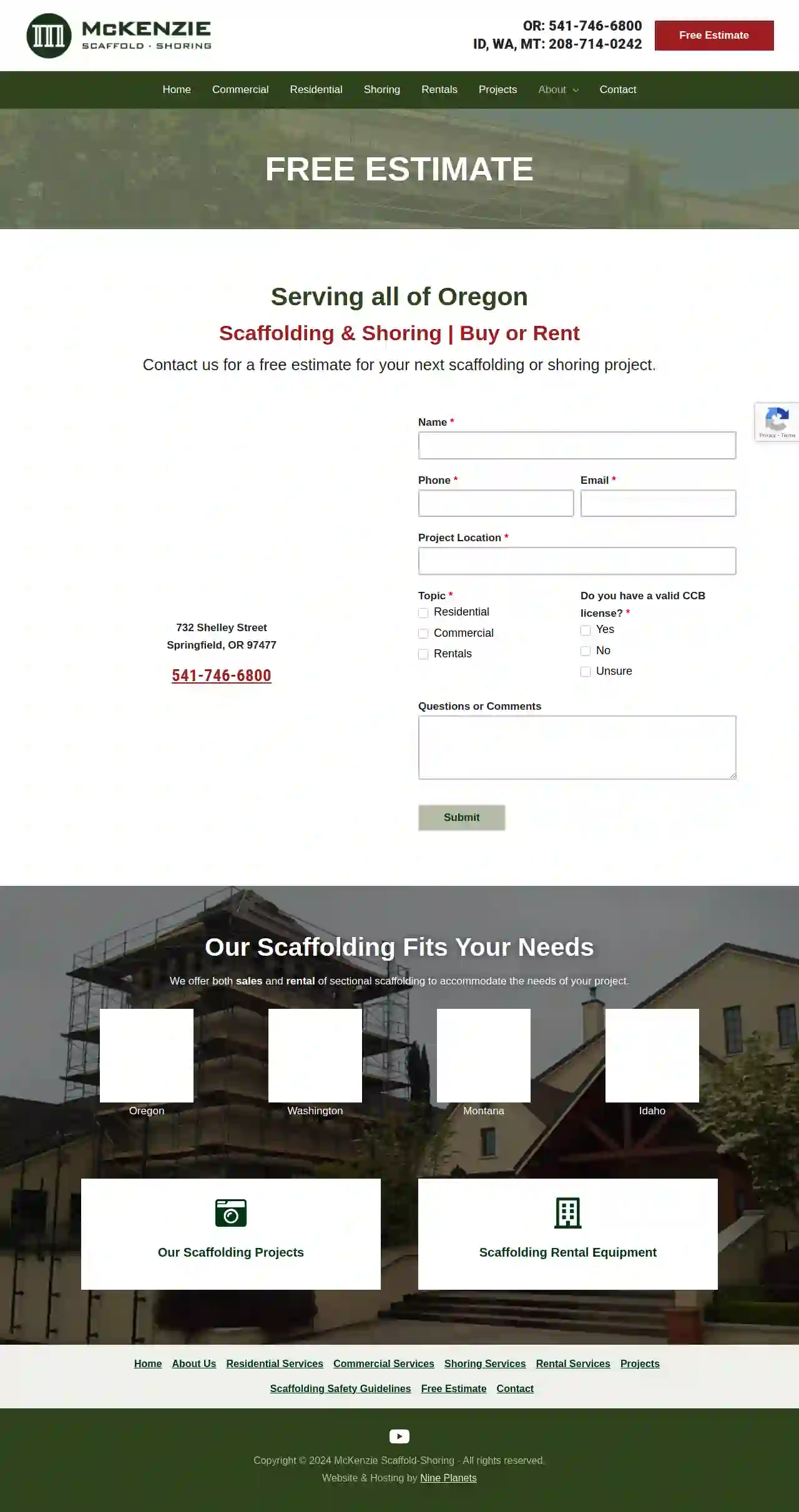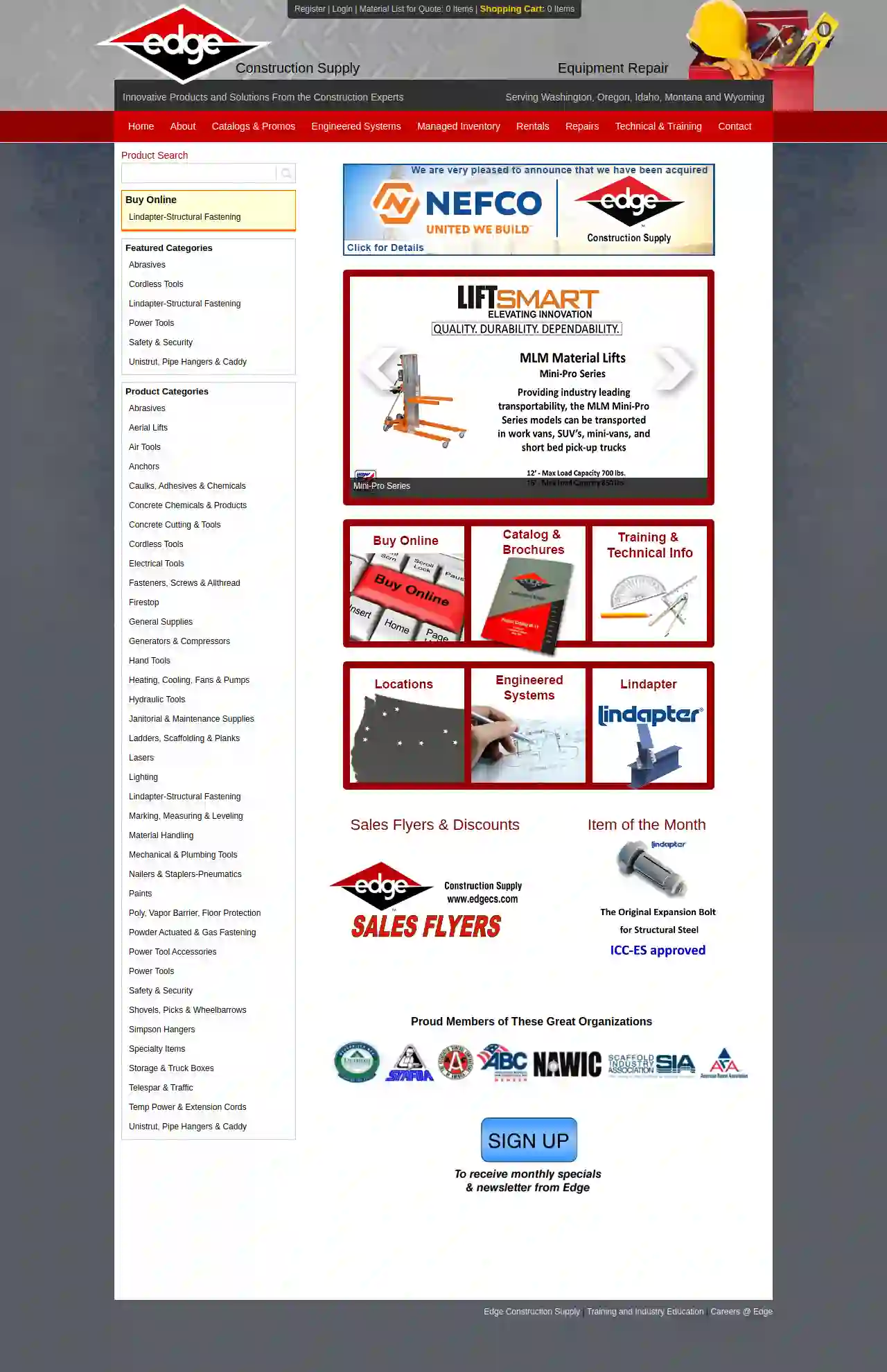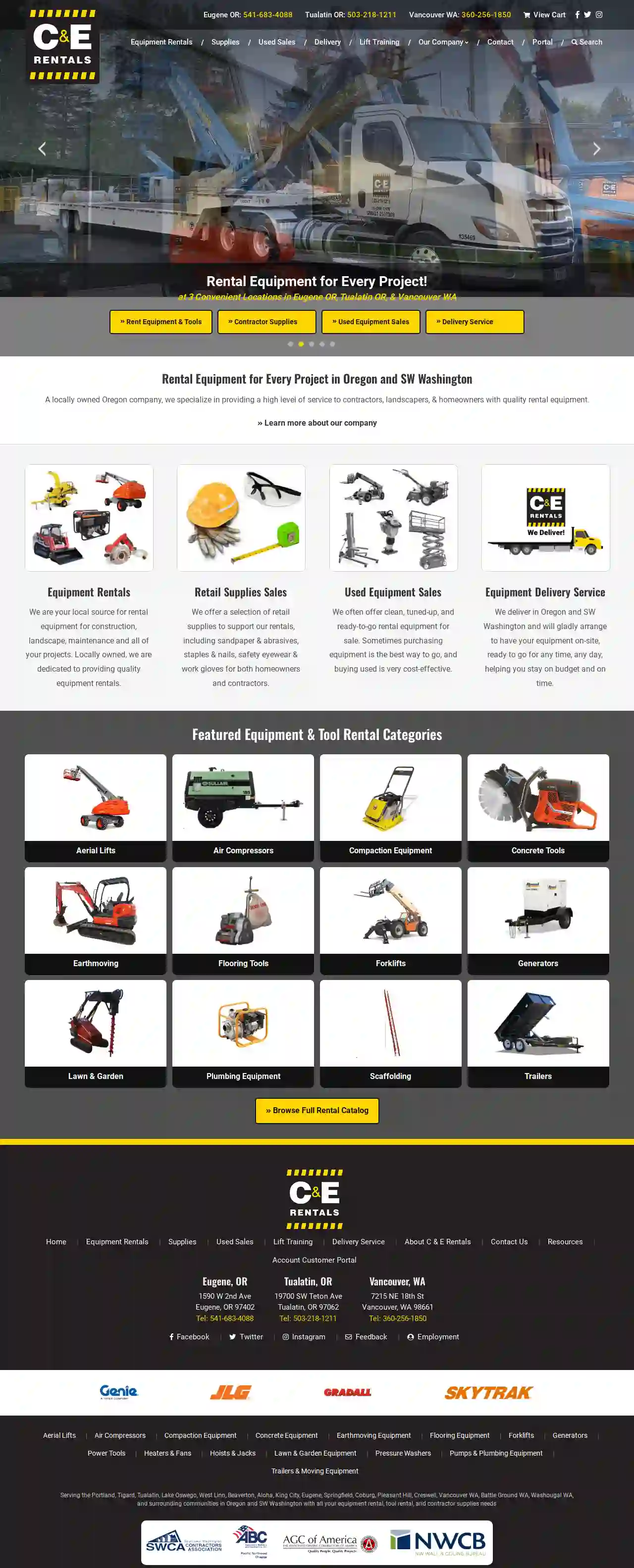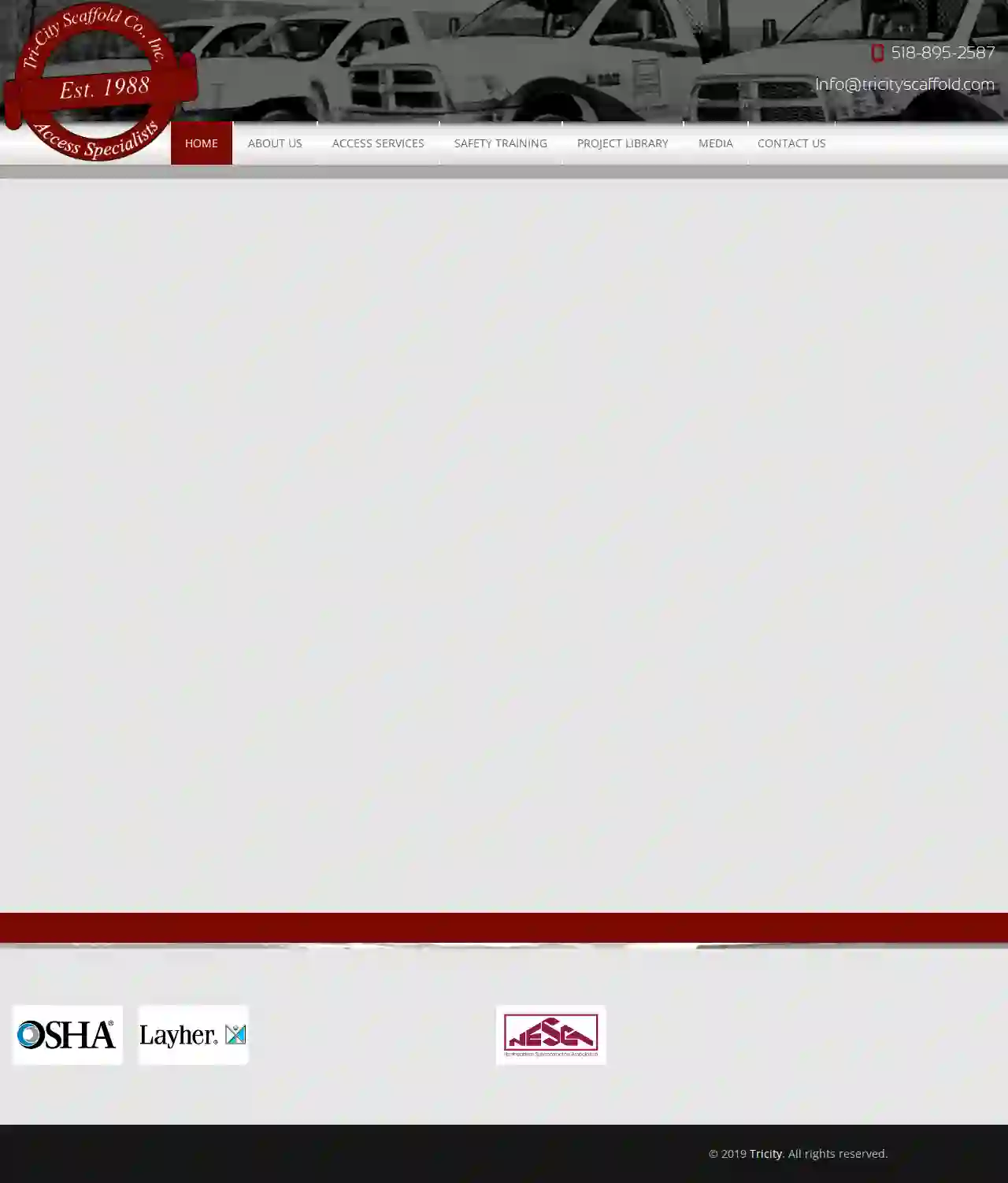Scaffolding Companies West Linn
Best Scaffolding Contractors in West Linn
Receive 3 FREE Scaffolding Contractors quotes for your project today! Compare profiles, reviews, accreditations, portfolio, etc... and choose the best service.

McKenzie Scaffold-Shoring
3.97 reviewsSpringfield, OR, 732 Shelley Street, 97477, USMcKenzie Scaffold • Shoring is a premier provider of scaffolding and shoring services, serving all of Oregon, Idaho, along with Eastern Washington and Western Montana. The company offers both sales and rental of sectional scaffolding to accommodate the needs of your project, ensuring outstanding safety performance, on-time and on-budget project management.
- Services
- Why Us?
- Accreditations
- Gallery
Get Quote
Edge Construction Supply
4.830 reviews123 Main St, Spokane, WA, 99201, USEdge Construction Supply has been serving the commercial construction and industrial markets for more than 70 years. We are headquartered in Spokane with eight additional branches including Seattle, Yakima, Kennewick, Boise, Eugene, Medford, Billings, and Idaho Falls. We proudly service our customers in Washington, Oregon, Idaho, and Montana. Our company has been built upon relationships with our customers. We provide expert service for your project and we aim to serve.
- Services
- Why Us?
- Accreditations
- Our Team
- Testimonials
- Gallery
Get Quote
C & E Rentals
4.4144 reviews1590 W 2nd Ave, Eugene, 97402, USRental Equipment for Every Project in Oregon and SW Washington A locally owned Oregon company, we specialize in providing a high level of service to contractors, landscapers, & homeowners with quality rental equipment. Learn more about our company Equipment Rentals We are your local source for rental equipment for construction, landscape, maintenance and all of your projects. Locally owned, we are dedicated to providing quality equipment rentals. Retail Supplies Sales We offer a selection of retail supplies to support our rentals, including sandpaper & abrasives, staples & nails, safety eyewear & work gloves for both homeowners and contractors. Used Equipment Sales We often offer clean, tuned-up, and ready-to-go rental equipment for sale. Sometimes purchasing equipment is the best way to go, and buying used is very cost-effective. Equipment Delivery Service We deliver in Oregon and SW Washington and will gladly arrange to have your equipment on-site, ready to go for any time, any day, helping you stay on budget and on time.
- Services
- Why Us?
- Gallery
Get Quote
Performance Equipment Rental
Newburgh, NY, 5301 Route 9W, 12550, USPerformance Equipment Rental LLC is a powerful architecture and construction theme that offers a wide range of equipment for rent. With branches in New York and New Hampshire, they provide top-notch services to clients across the region. Their mission is to provide high-quality equipment and exceptional customer service.
- Services
- Why Us?
- Accreditations
- Our Team
- Testimonials
- Gallery
Get Quote
BrandSafway Services Albany
47 reviewsAlbany, US- Services
- Why Us?
Get Quote
Tri-City Scaffold Co., Inc.
Delanson, NY, 282 Pannis Road, 12053, USTri-City Scaffold Co., Inc. is a family owned premier scaffolding company with a leading reputation for providing high quality and safe access solutions across the capital region and Upstate New York. Established in 1988, Tri-City Scaffold has consistently delivered expertise in access solutions across a wide range of industries meeting the needs of unique and complex projects spanning: institutional, industrial, civic, commercial, private, and government sectors. Experience, competence, and technical proficiency combined with an outstanding best practice compliance and safety record, ensures that our team of professional scaffolders persistently deliver superior results with maximum safety management. Tri-City’s unrivaled professional team of scaffold builders are the backbone of the company, with an impressive number employed at Tri-City for 14 years or more, as well as a new generation of builders that continue to cement the leading reputation of Tri-City Scaffold with every project.
- Services
- Why Us?
- Accreditations
- Our Team
- Testimonials
- Gallery
Get Quote- Gl
Glass Doctor of South Bend, IN
4.6147 reviewsBend, US- Services
- Why Us?
Get Quote - To
Tool & Truck Rental at The Home Depot
420 reviewsEugene, US- Services
- Why Us?
Get Quote - Br
BrandSafway Services Eugene
3.714 reviewsEugene, US- Services
- Why Us?
Get Quote - Me
Menards
4.3757 reviewsBend, US- Services
- Why Us?
Get Quote
Over 2,353+ Scaffolding Contractors onboarded
Our scaffolding contractors operate in West Linn & beyond!
ScaffoldingHQ has curated and vetted the Best Scaffolding Businesses in West Linn. Find a top & reliable contractor today.
Frequently Asked Questions About Scaffolding Companies
- Experience: 'How long have you been in business, and what experience do you have with projects like mine?'
- Licensing and Insurance: 'Are you fully licensed and insured, and can I see proof of coverage?'
- Safety Record: 'What are your safety procedures, and how do you ensure worker safety on the job site?'
- References: 'Can you provide references from previous clients?'
- Quotes and Costs: 'Can you provide a detailed quote that outlines all costs, including materials, labor, and any additional services?'
- Project Timeline: 'What is the estimated timeframe for scaffolding erection and dismantling?'
- Communication: 'How will you communicate with me throughout the project?'
- Work at Height Regulations 2005: Covers all work at height and outlines the need for risk assessments, competent erectors, and safe equipment.
- Construction (Design and Management) Regulations 2015 (CDM): Applies to construction projects and requires planning for scaffolding safety throughout the project lifecycle.
- British Standard BS EN 12811: Sets standards for the design, manufacture, and testing of scaffolding components.
- NASC (National Access & Scaffolding Confederation) Guidance: Provides industry best practices and safety recommendations for scaffolding.
- Licensing and Insurance: Verify their licenses are current and that they have adequate insurance coverage.
- Experience: Choose a company with a history of successfully completing similar projects. Ask for references and check their portfolio.
- Safety Record: Inquire about their safety practices and accident history. A strong safety culture is essential.
- Professionalism: Observe their communication, responsiveness, and attention to detail. A reputable company will be organized and transparent.
- Reviews and Testimonials: Read online reviews and feedback from previous clients to assess their reputation.
- Industry Affiliations: Membership in professional organizations like the NASC (National Access & Scaffolding Confederation) indicates a commitment to industry standards.
- Project Height and Access: The height of the structure and the accessibility of the working area are primary considerations.
- Load Capacity: The weight of workers, materials, and equipment that the scaffolding needs to support.
- Project Complexity and Shape: The shape and complexity of the structure may necessitate specialized scaffolding configurations.
- Ground Conditions: The type of ground (soft, uneven, sloping) will influence the scaffolding foundation and support requirements.
- Duration of Use: The length of time the scaffolding will be needed can impact the choice of system.
- Budget: Different scaffolding types have varying costs.
What questions should I ask a scaffolding company before hiring them?
What are the safety regulations for scaffolding in the USA?
How do I know if a scaffolding company is reputable?
How do I choose the right type of scaffolding for my project?
What questions should I ask a scaffolding company before hiring them?
- Experience: 'How long have you been in business, and what experience do you have with projects like mine?'
- Licensing and Insurance: 'Are you fully licensed and insured, and can I see proof of coverage?'
- Safety Record: 'What are your safety procedures, and how do you ensure worker safety on the job site?'
- References: 'Can you provide references from previous clients?'
- Quotes and Costs: 'Can you provide a detailed quote that outlines all costs, including materials, labor, and any additional services?'
- Project Timeline: 'What is the estimated timeframe for scaffolding erection and dismantling?'
- Communication: 'How will you communicate with me throughout the project?'
What are the safety regulations for scaffolding in the USA?
- Work at Height Regulations 2005: Covers all work at height and outlines the need for risk assessments, competent erectors, and safe equipment.
- Construction (Design and Management) Regulations 2015 (CDM): Applies to construction projects and requires planning for scaffolding safety throughout the project lifecycle.
- British Standard BS EN 12811: Sets standards for the design, manufacture, and testing of scaffolding components.
- NASC (National Access & Scaffolding Confederation) Guidance: Provides industry best practices and safety recommendations for scaffolding.
How do I know if a scaffolding company is reputable?
- Licensing and Insurance: Verify their licenses are current and that they have adequate insurance coverage.
- Experience: Choose a company with a history of successfully completing similar projects. Ask for references and check their portfolio.
- Safety Record: Inquire about their safety practices and accident history. A strong safety culture is essential.
- Professionalism: Observe their communication, responsiveness, and attention to detail. A reputable company will be organized and transparent.
- Reviews and Testimonials: Read online reviews and feedback from previous clients to assess their reputation.
- Industry Affiliations: Membership in professional organizations like the NASC (National Access & Scaffolding Confederation) indicates a commitment to industry standards.
How do I choose the right type of scaffolding for my project?
- Project Height and Access: The height of the structure and the accessibility of the working area are primary considerations.
- Load Capacity: The weight of workers, materials, and equipment that the scaffolding needs to support.
- Project Complexity and Shape: The shape and complexity of the structure may necessitate specialized scaffolding configurations.
- Ground Conditions: The type of ground (soft, uneven, sloping) will influence the scaffolding foundation and support requirements.
- Duration of Use: The length of time the scaffolding will be needed can impact the choice of system.
- Budget: Different scaffolding types have varying costs.